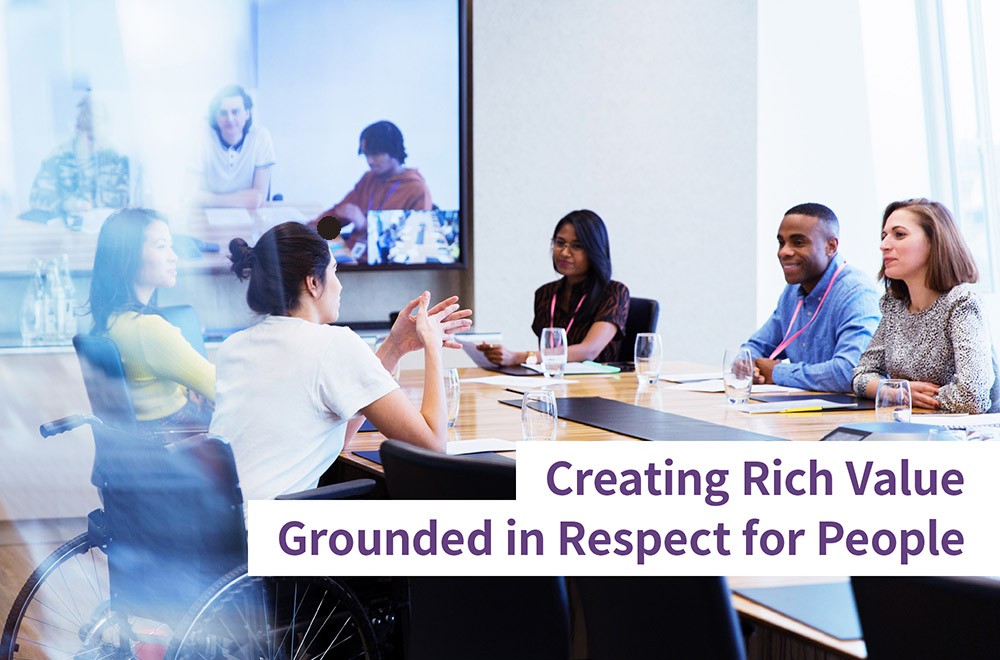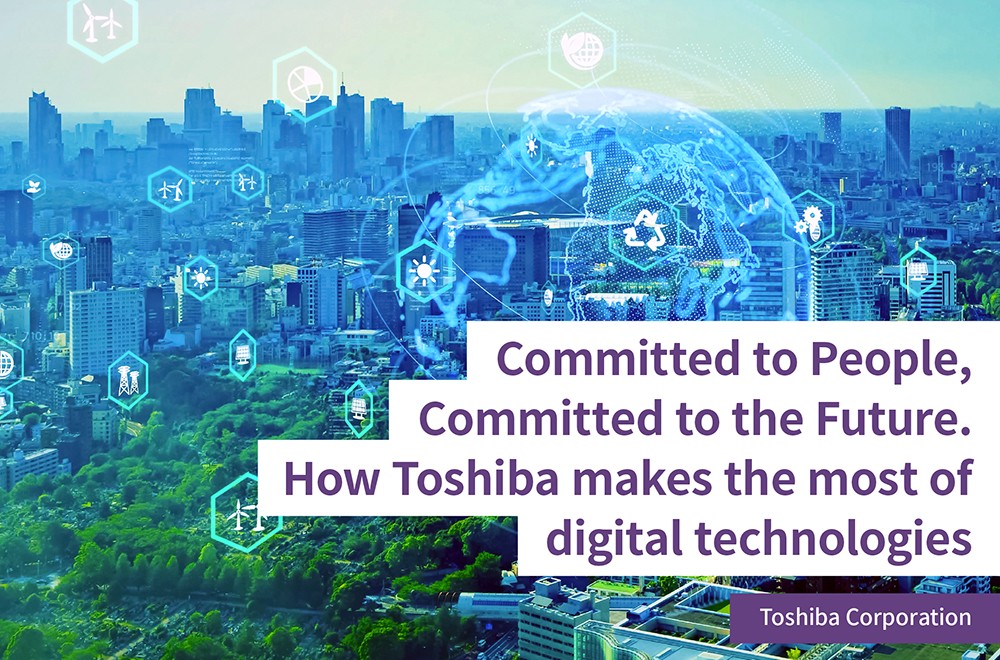Human Rights: The Foundation of Sustainable Business -Taking on Challenges, Hand-in-Hand With Suppliers
2024/03/06 Toshiba Clip Team
- Business must respect human rights in order for people and the planet to be sustainable
- Human rights must be respected across the entire supply chain
- Thinking about human rights is thinking about Toshiba’s Philosophy: “Committed to People, Committed to the Future.”

If we are to achieve a sustainable society, the human rights of all people must be respected, and people must be able to feel like they can live their lives true to themselves. Human rights are the rights that all human beings are entitled to from birth. When human rights are respected, people can pursue happiness without endangering their lives or suffering discrimination. Sadly, however, human rights issues such as child labor, forced labor, and human trafficking persist, not only in the world at large, but also in the realm of business.
For this reason, many companies are now formulating their own human rights policies and promoting respect for human rights. How can business build the foundation for a sustainable society? Junko Arima works on human rights issues in Toshiba’s Sustainability Management Division, while Emiko Shinohara works on supply chain management in the Procurement Division. We turned to them to get their take on human rights principles, concrete measures, and their outlook on the future. In this issue, we will also report on how different elements of the Toshiba are working together toward the same goals around the world, presenting readers with a case study from Toshiba Information Equipment (Philippines), Inc., which involves its suppliers in promoting sustainability activities, including respect for human rights.
Understanding Business and Human Rights as Inseparable
Adopted by the United Nations in 2011, the “Guiding Principles on Business and Human Rights” is one of the key elements that brought the importance of respect for human rights to the fore in the business world. Starting from the basic premise that “Business enterprises should respect human rights,” the Guiding Principles offer specifics on measures such as “carry[ing] out human rights due diligence*1” and “identify[ing] and assess[ing] any actual or potential adverse human rights impacts.” Arima, who works on promoting sustainability activities at Toshiba, spoke about the current trends in respect for human rights and the state of play of Toshiba’s efforts.
*1 To disclose information, having incorporated responsible behavior into management policies and systems, identified and assessed any adverse impacts, and stopped, prevented, and mitigated said adverse impacts.
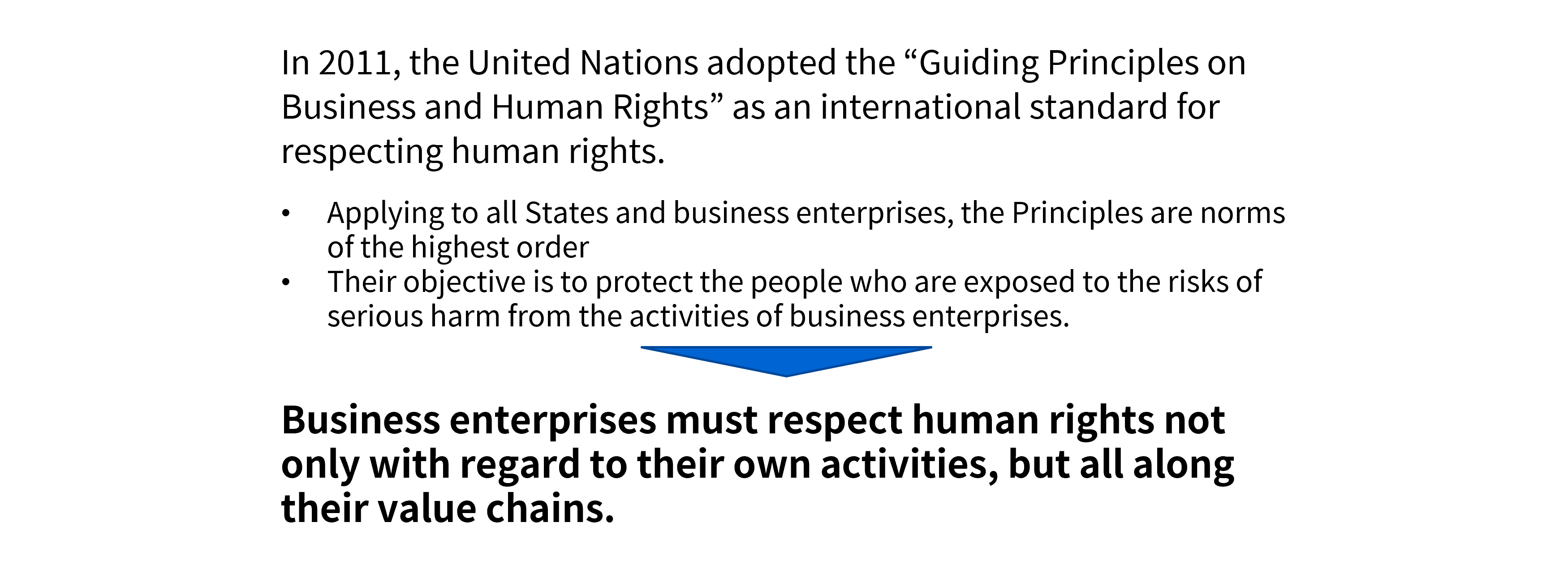
In a global society, respect for human rights is essential for doing business
“In addition to complying with the UN Guiding Principles, it is a global standard to disclose not only financial information, but also non-financial information including human rights. As a key element of the S (Social) of ESG,*2 respect for human rights is also essential for the establishment of sustainable management. As a corporation with global business operations, it is necessary for Toshiba to respect the human rights of all of its stakeholders in accordance with international standards and to communicate those efforts.
“At Toshiba we follow a Philosophy to be ‘Committed to People, Committed to the Future.’ Many employees will understand this as a guiding principle for respecting human rights, but I must admit that the awareness and practice of respect for human rights in line with the UN Guiding Principles is still insufficient. We will continue working across the entire Toshiba to continue educating our people so that they can see the protection of human rights as a personal matter.” (Arima)
*2 Activities to assess and select investment opportunities from the perspectives of the environment (E), social (S), and governance (G)
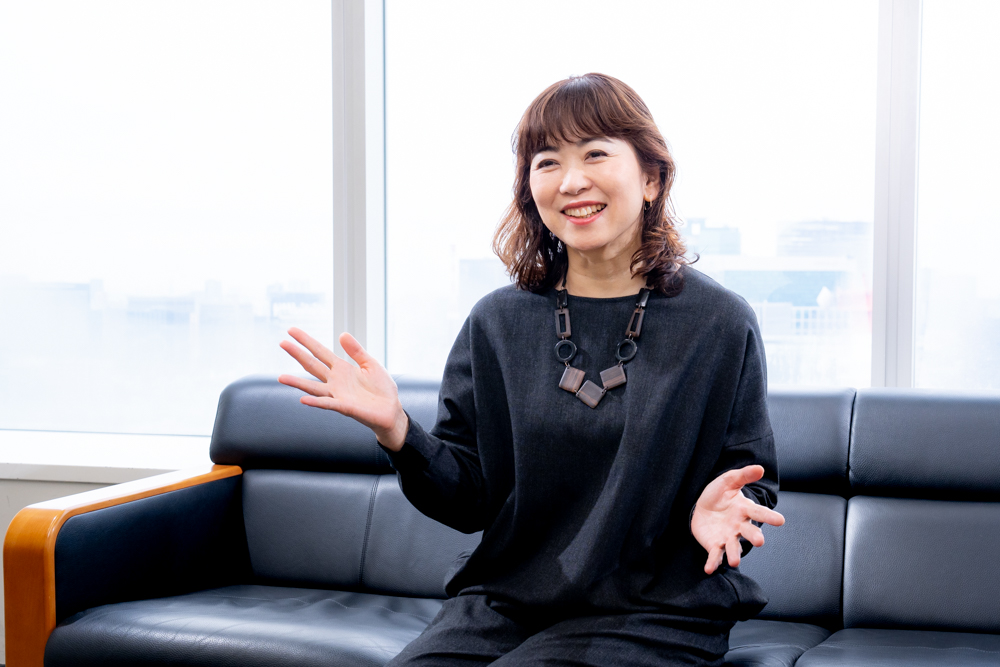
Junko Arima, Expert, Sustainability Management Division, Toshiba Corporation
Arima and her colleagues in the Sustainability Management Division hold regular meetings with the procurement, legal, and human resources divisions to share global trends and discuss measures to promote respect for human rights. Arima emphasizes her future-oriented mindset whenever she speaks. “We will collaborate closely with internal and external stakeholders,” she says, “to raise the level of understanding and awareness among employees across the board, including top management.
“In order to put respect for human rights into practice in business, you have to be able to explain how business and human rights relate to each other in your own words. That is why we conduct in-house training to teach our employees how human rights are tied to the businesses they are involved in.
“Of course, we in the Sustainability Management Division also need to keep learning. We participate in workshops held by groups such as the USA nonprofit organization (NPO) BSR,*3 the United Nations Global Compact,*4 the industry association JEITA,*5 and others, and exchange opinions with other companies. In addition to following global trends and learning best practices, we will examine the activities and measures where we fall short and compensate for them. I believe that this sort of honest, clear-eyed approach will lead us to the practice of respect for human rights required of us as a company.” (Arima)
*3 Business for Social Responsibility: An NPO that promotes sustainability to the business community
*4 A UN initiative to help companies achieve sustainable growth
*5 The Japan Electronics and Information Technology Industries Association: An industrial association representing Japan in the digital industry
Hand-in-hand Toward a Sustainable Tomorrow: Working with Suppliers to Tackle Challenges
Respect for human rights is also important in the field of procurement, where Toshiba engages with many suppliers. Emiko Shinohara, who works on supply chain management, comes at this topic with a sense of urgency. “Companies that fail to take respect for human rights seriously,” she says, “will see their global presence diminish as people stop choosing them.” Despite her calm composure, one can sense how strongly she feels about the topic as she speaks.
“In Europe, legislation on human rights is being developed, and companies that do not comply are unable to maintain their competitiveness as business partners. However, rather than being swayed by the prevailing trends of the moment, we need to be constantly raising awareness, identifying human rights issues, and engaging in dialogue with our suppliers to make improvements.” (Shinohara)

Emiko Shinohara, Expert, Supply Chain Management Promoting Group, Procurement Control & Compliance Promoting Department, Procurement Division, Toshiba Corporation
Companies should not treat respect for human rights as something limited to the space within their own walls. It is essential to consider human rights across the entire length of the value chain and put measures in place to ensure they are respected. Examples of activities to carry out would include human rights due diligence and identifying human rights issues, but it is important to keep in mind that respect for human rights is not merely a “means” to protect a brand or circumvent business risks. One must recognize that respect for human rights is a prerequisite for corporate activities.
As part of its human rights due diligence, Toshiba’s Procurement Division has been conducting questionnaire-based risk assessment surveys of suppliers since 2021. Toshiba has many business partners in Japan and other Asian countries, so the company formulated its questions with them in mind, developing its own, original survey while using other materials as references, such as the self-assessment sheet of the RBA*6 (a corporate alliance that promotes social responsibility), JEITA’s “Responsible Business Conduct Guidelines,” and the self-assessment questionnaire linked with the JEITA guidelines.
*6 Responsible Business Alliance: a nonprofit organization established to promote responsible business practices in supply chains
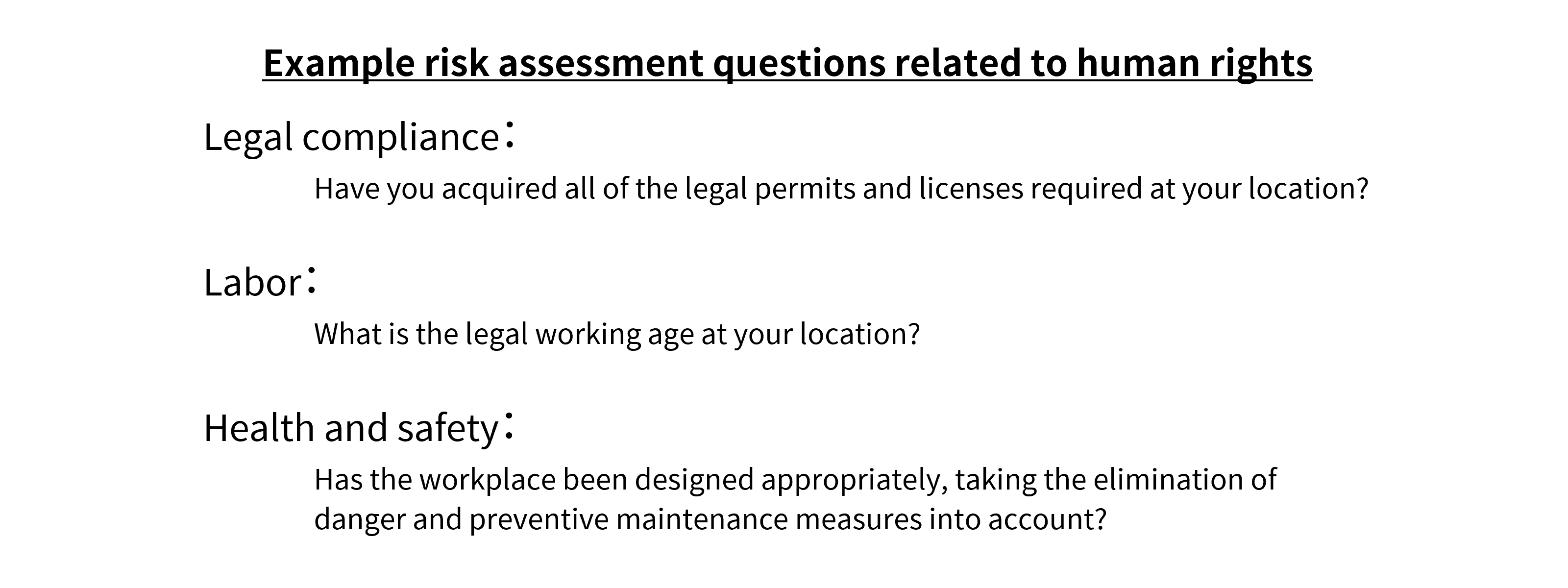
Toshiba evaluates suppliers’ handling of human rights from the perspectives of legal compliance, labor, and health and safety
“In FY2022, we gave individual feedback to suppliers on areas that posed high risks and asked them to consider corrective measures. Some of our suppliers saw it as a wake-up call and realized that their previous efforts had been inadequate. They went on to make improvements to their working environments. Although it’s just one step at a time, I feel that we are making progress toward respecting human rights. We will continue with such efforts, but we want to emphasize our commitment to working together on human rights issues, rather than imposing our views.” (Shinohara)
When giving feedback to suppliers, Shinohara and her colleagues made sure that they were not simply dictating Toshiba’s human rights and procurement policies. Instead, they took care to help suppliers to understand the need for businesses to respect human rights, supplying explanatory materials that explained global trends and other information. They believed that it was important to align themselves with suppliers to reach a common understanding on respect for human rights, and this would be a step toward resolving human rights issues.
“The initiatives we undertook with our suppliers will be broader in scope, but they should help us to reach solutions that much faster. As legislation is being developed around the world, it will be essential for Japanese companies to think about and respect human rights throughout their value chains.
“We cannot simply wait for the time to come. Now that respect for human rights has become an important element of business, we will work together with our suppliers to align our viewpoints and tackle issues so that we do not fall behind in our efforts.” (Shinohara)
Thinking About Human Rights is Thinking About Philosophy: “Committed to People, Committed to the Future.”
Ambitious efforts are underway at multiple locations to promote respect for human rights with suppliers. One such example can be found at Toshiba Information Equipment (Philippines), Inc., which has about 7,500 employees and is producing large capacity HDDs essential for data centers. Every year the company conducts training on sustainability activities for its suppliers. The training program aims to educate people about corporate social responsibility while also communicating the essentials of sustainability. Nenoca Oquialda, who leads procurement at the company, gave an overview.
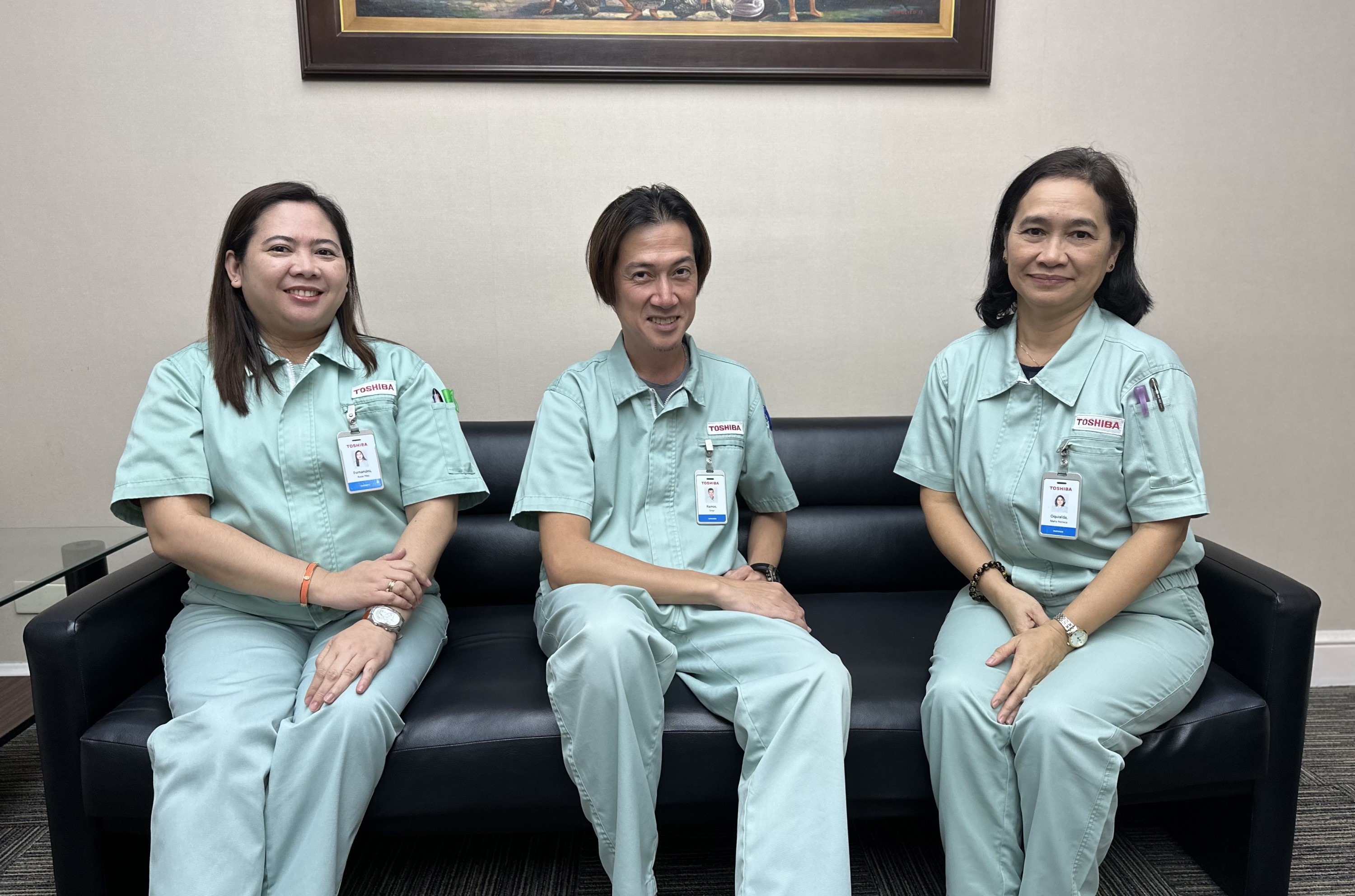
From left: Fernandez Rosiemay, Human Resources Manager, Ramos Emyr General Affairs Manager, Nenoca Oquialda, Procurement Manager, Toshiba Information Equipment (Philippines), Inc.
“We continually deepen our relationship with our suppliers as we give briefings on labor, ethics, health and safety, and environmental management. We present challenges that stand in the way of us fulfilling our social responsibilities and discuss how to resolve them based on Toshiba’s Philosophy to be ‘Committed to People, Committed to the Future’ and values such as ‘Do the right thing.’ We then share and implement best practices. We have been doing this for more than 20 years, and we are proud to be a leading company in the Philippines.” (Nenoca Oquialda)
In the Philippines, there is a word Bayanihan, which means, “people in the village helping one another.” Toshiba’s sustainability activities exemplify Bayanihan and foster ever closer cooperation with suppliers. At a recent Fun Run event held to promote health and wellness every year, for example, 1,200 people from 59 suppliers participated. According to Ramos Emyr, who was involved in running this activity, it is important to “nurture a sense of community and increase transparency in information sharing.”
“We discuss the significance of our sustainability activities, and employees exchange their views and opinions as we go through the cycles of verifying and improving our efforts concerning human rights. We want to carry out our activities in a consistent manner over the long term. There are absolutely no walls between management and employees in this regard, and we have initiatives coming both from the top down and from the bottom up. What we need in order to increase their effectiveness is mutual appreciation, a shared understanding of the meaning of the efforts, and a sense of hope.” (Ramos Emyr)
“This is one of the most advanced initiatives at Toshiba. I would like to move forward with the same sentiments,” said Arima, expressing her hopes for the Toshiba Information Equipment (Philippines) activities. Her focus was on the aspirations of the employees who “make the Toshiba Basic Commitment their own and put it into practice.” Human rights issues are broad and diverse, including child labor, forced labor, inadequate health and safety, harassment, violations of privacy, and discrimination. In order to persevere in these efforts, it is important to have deeply rooted convictions.
Shinohara and Arima pointed out that it is in addressing human rights issues that “Toshiba, with its global and extensive business domains, can put its foundations and strengths to good use.”
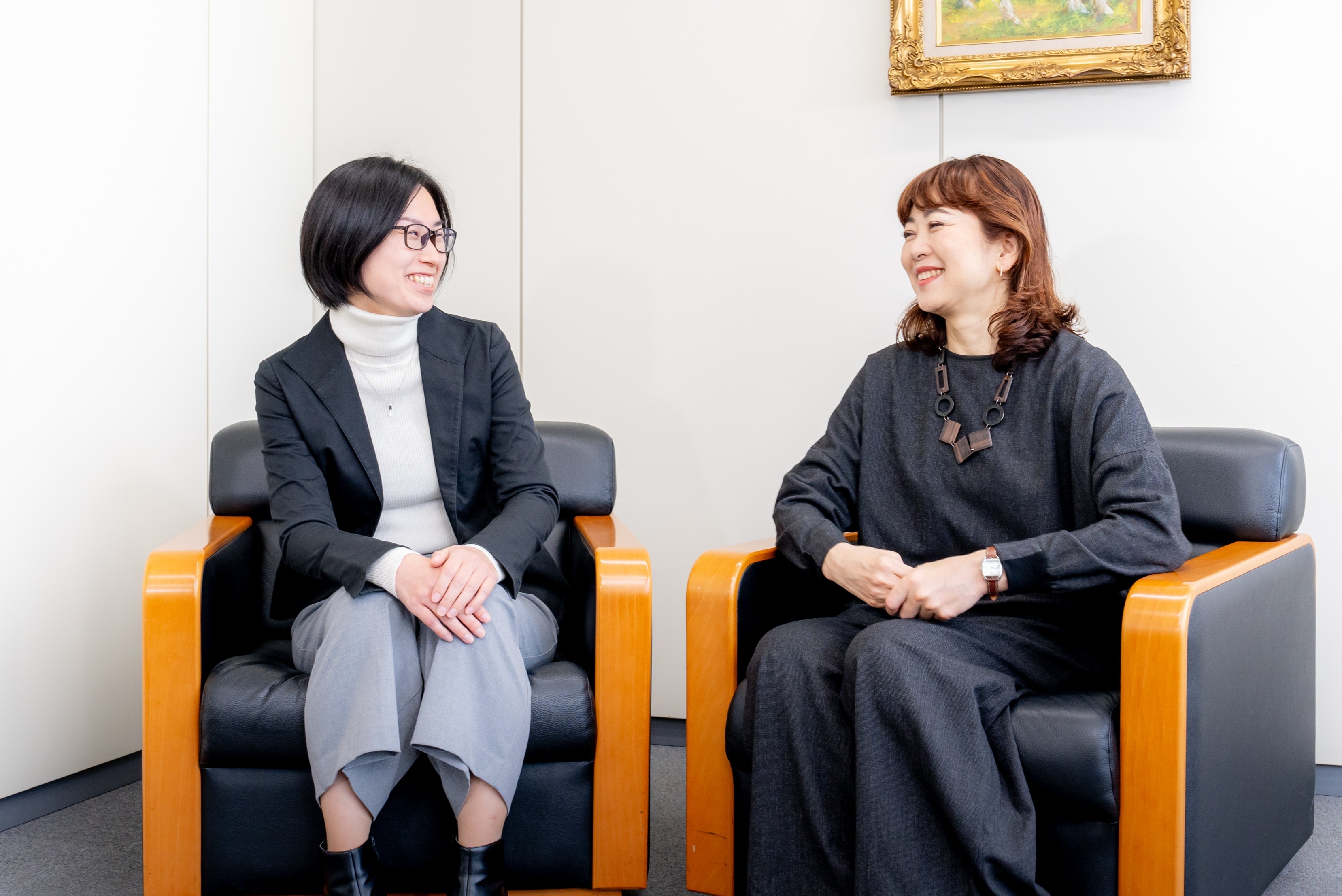
Shinohara (left) and Arima (right) discuss respect for human rights and Toshiba’s strengths
“Our strength is that we can take a bird’s eye view of many different business areas and engage in a wide range of sustainability activities for small, medium, and large suppliers around the world. Leveraging the external partnerships, we have fostered through the procurement activities of the entire Toshiba, we will contribute to solving the issues. That, we believe, is what makes the existence of Toshiba worthwhile.” (Shinohara)
“I want each person to understand why the world pays so much attention to human rights. As more employees deepen their understanding, they will naturally become more committed to respecting them. I believe that collaboration within the company will solve various business-related human rights issues and contribute to the development of a sustainable society.” (Arima)
Respect for human rights is at the core of Toshiba’s Philosophy: “Committed to People, Committed to the Future.” This philosophy is the starting point of Toshiba’s sustainability activities and a source of inspiration for employees. In order to achieve a sustainable society, we must cherish each and every human being that makes up our society. To think about human rights is to be committed to people and the future.
![]()
Related Links
*This section contains links to websites operated by companies and organizations other than Toshiba Corporation.
Procurement Policy | Procurement | Toshiba





